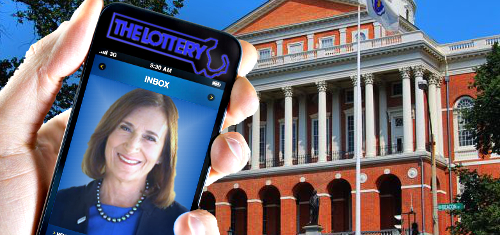Massachusetts’ state treasurer has made good on her promise to reintroduce legislation that would allow the state lottery to take its action online.
 Last month, state treasurer Deborah Goldberg (pictured) promised to introduce her new ‘iLottery’ legislation by Nov. 2. On Wednesday, Goldberg followed through, filing a bill with the state legislature that would allow the Massachusetts Lottery to offer draw tickets and online games via web and mobile device.
Last month, state treasurer Deborah Goldberg (pictured) promised to introduce her new ‘iLottery’ legislation by Nov. 2. On Wednesday, Goldberg followed through, filing a bill with the state legislature that would allow the Massachusetts Lottery to offer draw tickets and online games via web and mobile device.
The bill’s text has yet to surface online, but the Boston Globe reported that the bill leaves most decisions on game types, prize sizes and such up to the Massachusetts State Lottery Commission. The bill would include problem gambling protections, including self-exclusion and spending limits, and would prevent funding online lottery play via credit card.
The bill would also seek to ease the concerns of lottery retailers by requiring the Commission to promote retail lottery sales. Retailers would be allowed to sell prepaid gift cards with which players could fund their online lottery accounts.
This isn’t the first time the iLottery pitch has been made. In July, the state Senate approved a similar measure introduced by Sen. Jennifer Flanagan, but this measure was eventually stripped from the state’s economic development package that was approved later that month.
This week also brought the first meeting of the state’s Special Commission on Online Gaming, Fantasy Sports Gaming and Daily Fantasy Sports. The Commission’s mandate is to provide the legislature with a comprehensive plan to regulate online gaming activity.
On July 31, the state legislature granted legal approval of DFS but left the nuts and bolts of DFS regulation up to the Commission. Not much of substance happened at Monday’s inaugural meeting, but the Commission plans to meet every four weeks or so and hand its final recommendations to the legislature by July 31, 2017. The state would then have one year in which to approve or reject these findings.
The Commission is led by Rep. Joseph Wagner and Sen. Eileen Donoghue, who chair the Joint Committee on Economic Development and Emerging Technologies. Other members include Sen. Flanagan, Massachusetts Gaming Commission chairman Stephen Crosby, the assistant attorney general and the Fantasy Sports Trade Association’s Peter Schoenke.
In January, the Massachusetts Gaming Commission released a White Paper suggesting the legislature may not want to limit itself by focusing purely on DFS, while ignoring online gambling, social gaming, eSports, sports betting ,etc. The Commission suggested omnibus legislation “broad enough and flexible enough to adapt to any and all of these proliferating games may be worth serious consideration.”





